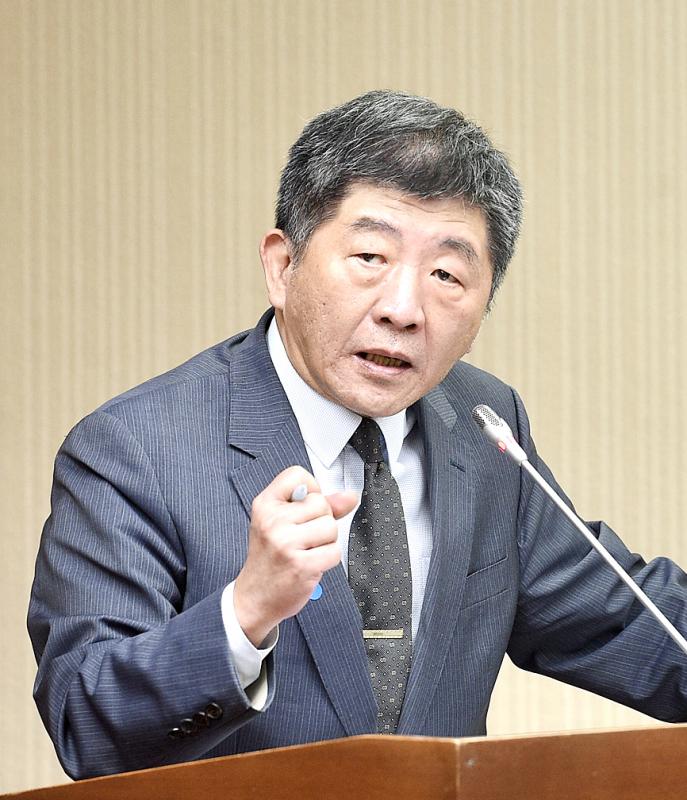The nation’s COVID-19 vaccination program has proceeded a little slower than expected, so the Central Epidemic Command Center (CECC) is considering expanding the program to include more priority groups, Minister of Health and Welfare Chen Shih-chung (陳時中) said at a meeting of the Social Welfare and Environmental Hygiene Committee at the legislature in Taipei yesterday.
At present, vaccines are being offered to frontline healthcare workers at hospitals dealing with COVID-19 cases, but as of Sunday only 9,377 jabs had been administered.
As the first batch of about 117,000 doses of the AstraZeneca vaccine has an expiration date of June 15, legislators expressed concern that they would not be used in time.

Photo: Peter Lo, Taipei Times
The number of vaccines administered in the first week was lower than the center had expected, Chen said, adding that the reason was likely because of media reports of adverse side effects overseas that have dented people’s confidence in the AstraZeneca vaccine.
“We allow people to freely choose if they want to get vaccinated and we arranged a priority list for the rollout so that people in higher-priority groups could get the vaccine first, but if their willingness to get vaccinated is low we could gradually offer the vaccine to lower-priority groups,” Chen said.
The center would discuss the issue and likely make an announcement tomorrow, he said.
Chen was asked whether the center had made any progress in its discussions with BioNTech in the past month after the minister last month said in an interview that Taiwan was close to securing a deal to purchase 5 million doses of the Pfizer-BioNTech vaccine last year, but the deal fell through at the last minute, possibly due to “intervention from outside forces.”
After the interview was published, Reuters reported that BioNTech said that the company was still planning to provide vaccines to Taiwan and that discussions were ongoing.
The center had asked the Ministry of Foreign Affairs to clarify the situation, Chen said, and the company had said that it might have to postpone providing the vaccine to Taiwan by several weeks or months due to supply-chain issues. Taiwan would likely have received other vaccines or domestically produced vaccines by that time, so the possibility of signing a contract with BioNTech has receded, he said.
Separately, Centers for Disease Control Deputy Director-General Chuang Jen-hsiang (莊人祥), who is also CECC spokesman, said the next priority group for vaccination would likely be “non-healthcare workers” at hospitals dealing with COVID-19 cases, as well as “healthcare workers at other facilities,” but that a decision would be made at a CECC specialists’ meeting.
Those who were vaccinated last week would need to receive a second dose in late May at the earliest, Chuang said, adding that the center is negotiating with AstraZeneca and COVAX to secure another shipment and that he was confident it would arrive in time.
Meanwhile, the center yesterday reported one new imported COVID-19 case, a Taiwanese who had returned from the Philippines.
Additional reporting by CNA

NO HUMAN ERROR: After the incident, the Coast Guard Administration said it would obtain uncrewed aerial vehicles and vessels to boost its detection capacity Authorities would improve border control to prevent unlawful entry into Taiwan’s waters and safeguard national security, the Mainland Affairs Council (MAC) said yesterday after a Chinese man reached the nation’s coast on an inflatable boat, saying he “defected to freedom.” The man was found on a rubber boat when he was about to set foot on Taiwan at the estuary of Houkeng River (後坑溪) near Taiping Borough (太平) in New Taipei City’s Linkou District (林口), authorities said. The Coast Guard Administration’s (CGA) northern branch said it received a report at 6:30am yesterday morning from the New Taipei City Fire Department about a

IN BEIJING’S FAVOR: A China Coast Guard spokesperson said that the Chinese maritime police would continue to carry out law enforcement activities in waters it claims The Philippines withdrew its coast guard vessel from a South China Sea shoal that has recently been at the center of tensions with Beijing. BRP Teresa Magbanua “was compelled to return to port” from Sabina Shoal (Xianbin Shoal, 仙濱暗沙) due to bad weather, depleted supplies and the need to evacuate personnel requiring medical care, the Philippine Coast Guard (PCG) spokesman Jay Tarriela said yesterday in a post on X. The Philippine vessel “will be in tiptop shape to resume her mission” after it has been resupplied and repaired, Philippine Executive Secretary Lucas Bersamin, who heads the nation’s maritime council, said

REGIONAL STABILITY: Taipei thanked the Biden administration for authorizing its 16th sale of military goods and services to uphold Taiwan’s defense and safety The US Department of State has approved the sale of US$228 million of military goods and services to Taiwan, the US Department of Defense said on Monday. The state department “made a determination approving a possible Foreign Military Sale” to the Taipei Economic and Cultural Representative Office in the US for “return, repair and reshipment of spare parts and related equipment,” the defense department’s Defense Security Cooperation Agency said in a news release. Taiwan had requested the purchase of items and services which include the “return, repair and reshipment of classified and unclassified spare parts for aircraft and related equipment; US Government

More than 500 people on Saturday marched in New York in support of Taiwan’s entry to the UN, significantly more people than previous years. The march, coinciding with the ongoing 79th session of the UN General Assembly, comes close on the heels of growing international discourse regarding the meaning of UN Resolution 2758. Resolution 2758, adopted by the UN General Assembly in 1971, recognizes the People’s Republic of China (PRC) as the “only lawful representative of China.” It resulted in the Republic of China (ROC) losing its seat at the UN to the PRC. Taiwan has since been excluded from